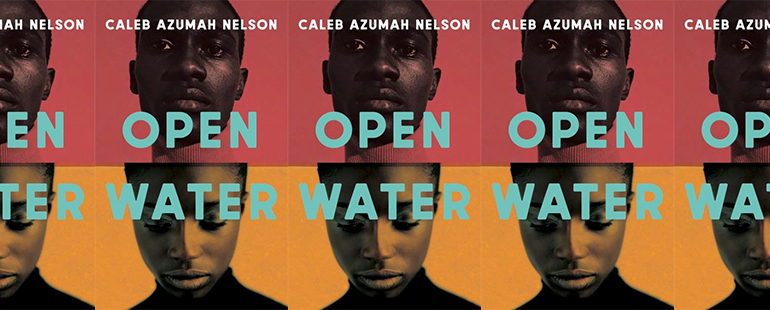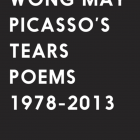Open Water by Caleb Azumah Nelson

Open Water
Caleb Azumah Nelson
Black Cat | April 13, 2021
Adherents of New Sincerity tend to approach difficult questions (about love, race, capitalism, etc.) through emotional excavation rather than intellectual attrition. No longer a trend but a ubiquitous mode in literary fiction, the New Sincerity movement can be understood, per critic Adam Kelly, as “a congruence of avowal and actual feeling” that “places emphasis on intersubjective truth and communication with others” over, say, ironic detachment or shifts into hyperreality, both hallmarks of postmodernism. But fiction that intends to, above all, move a reader risks shading unfavorably into melodrama or pulpy sentimentality—crimes punishable by death in postmodernism. Many contemporary novels (and story collections), however, prove that this risk is worth taking: Phillippe Benson’s Lie With Me, Bryan Washington’s Lot, and Ocean Vuong’s On Earth We’re Briefly Gorgeous, to name but a few, all cast clear-eyed vulnerability on their subjects, not shying away from the electricity of feeling crackling below their stories’ surface.
In his anticipated debut novel, Open Water, Caleb Azumah Nelson similarly finds form in emotional devastation. Centered around a romance between two young Black British artists, the novel’s unnamed second-person narrator bleeds himself dry on the page, expressing his desire and suffering with desperate clarity. Take these lines from the prologue: “You lost her gaze for a moment and your breath quickened . . . You would soon learn that love made you worry, but it also made you beautiful . . . Sometimes you cry in the dark.” The narrator wants to dissolve himself in his partner’s love, but systemic forces prevent such a simple escape. Amid pervasive police profiling and racial violence, he knows that the path to freedom entails embracing his Blackness and subverting his masculine conditioning, the latter of which demands he bottle up his trauma. Although falling in love seems to offer temporary salvation, the novel argues that some scars need more than just domestic partnership to heal.
At first, Open Water’s love story appears familiar. Meeting his friend Samuel for drinks one night, the narrator develops an instant connection with Samuel’s girlfriend, a dancer and university student. After a brief bout of small talk, he senses “things which you both know and speak with your very being, but here go unsaid.” They make plans to hang out without Samuel and, when alone, their connection deepens. Chemistry abound, they relish in their many similarities. Both attended private, mostly White high schools. Both have grand artistic ambitions but uncertain futures. Both love Isaiah Rashad and Zadie Smith and Barry Jenkins, artists who serve as both mirrors and muses. After Samuel breaks up with the also unnamed woman, she and the narrator teeter toward romance. They hold hands, share earbuds, sleep amicably in the same bed, and slowly reveal their pasts over the course of a summer.
They eventually become a couple, despite her studying in Dublin and his living in London. The long-distance, though, isn’t the force that pulls them apart. Instead, several startling instances distance the narrator from his girlfriend. Meandering through the city, he constantly feels watched by police. He pulls his sweatshirt hood down whenever a cruiser passes. While walking home, officers interrogate him about a string of robberies in the neighborhood, claiming he fits the description of the burglar. These scenes lead to some of Azumah Nelson’s best writing: “How strange a life you and other Black people lead, forever seen and unseen, forever heard and silenced . . . when they, the police, are close, you lose your names and you have all done wrong.” After witnessing a formerly incarcerated friend die in a bicycle accident, the narrator draws further inward, unable to tell his partner of the pain buried beneath his posture of strength. For him, shutting her out is not a choice; depression renders him helpless. In one of the novel’s most provocative moments, the narrator articulates his interminable suffering: “You ache. You ache all over. You are aching to be you, but you’re scared of what it means to do so.” It’s a stunning moment of emotional climax that tenderly clarifies the narrator’s paradoxical struggle to love himself in a system that wants him dead or incarcerated.
But in a book brimming with brilliant ideas and charming interiority, Open Water struggles to temper its lyricism and narrative ambitions, resulting in a captivating if not uneven read. The narrator tends to announce his emotions exactly as they are (“that anger which is the result of things unspoken”; “a symptom of something which could be known as joy”; “to love is to trust, to trust is to have faith”) and imbues seemingly insignificant moments with a confusing gravitas (“she closes her eyes and lets an almighty yawn stretch through the silence. It’s contagious and she laughs as the baton is passed in a race only sleep will win”). It can thus be difficult to distinguish the sublime from the sappy, the profound from the pedantic. And in a novel where there is no shortage of profundity, such overwriting creates a dissonance between what the author wants the reader to feel and what the reader may have been induced to feel without such specific instruction. The melodrama zaps otherwise searing moments of emotional weight.
Nonetheless, Open Water is a moving novel that celebrates Black art and explores generational trauma. In a moment midway through the book, when discussing the British-Ghanaian painter Lynette Yiadom-Boakye, the narrator’s partner explains why the painter, and the novel we’re reading, are indispensable: “[Yiadom-Boakye externalizes] interiority, which isn’t something Black people are afforded very often.” By externalizing a young Black artist’s interiority, Azumah Nelson succeeds in transforming his “you” into an “I,” compelling us to speak his name loud and clear.



